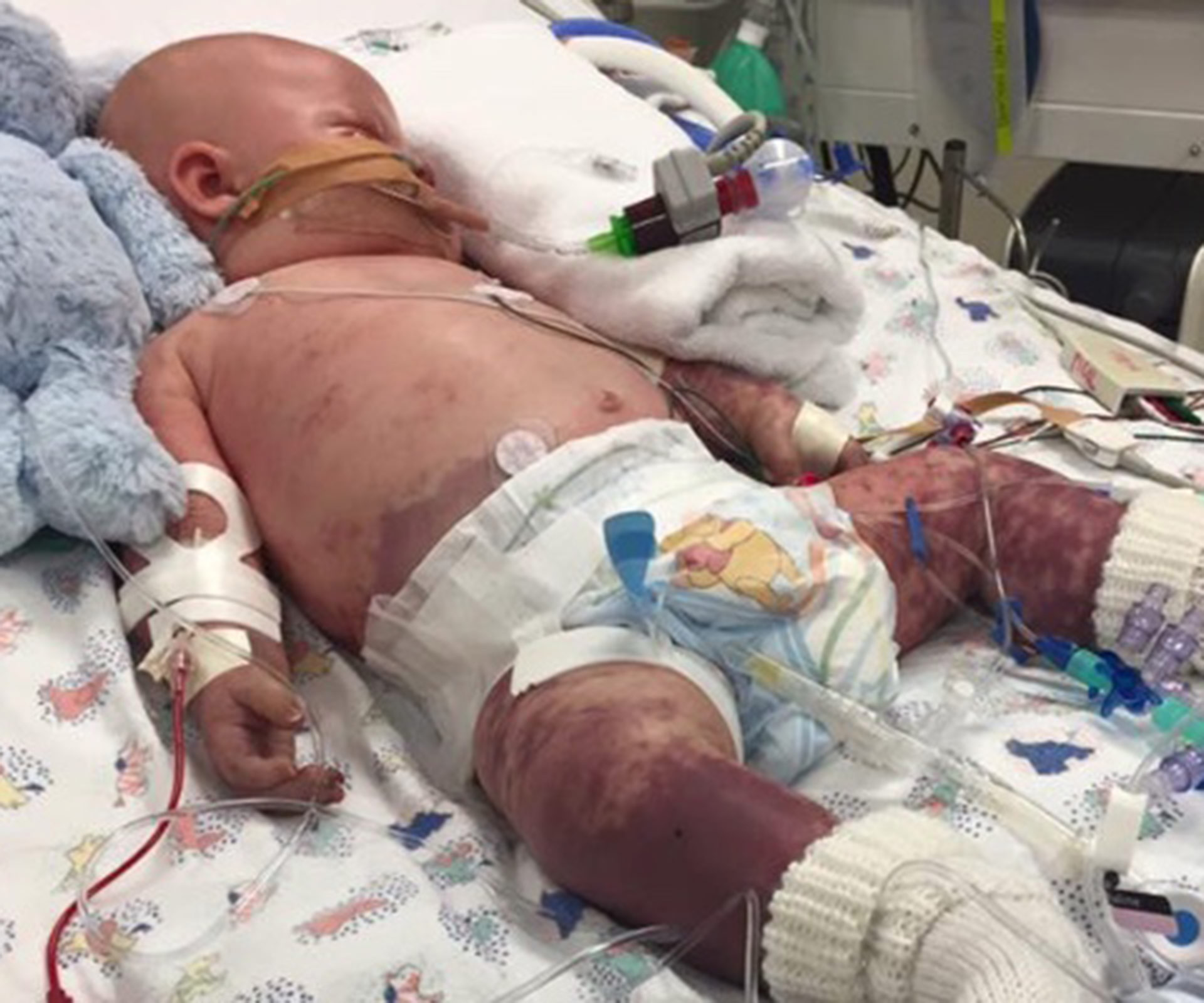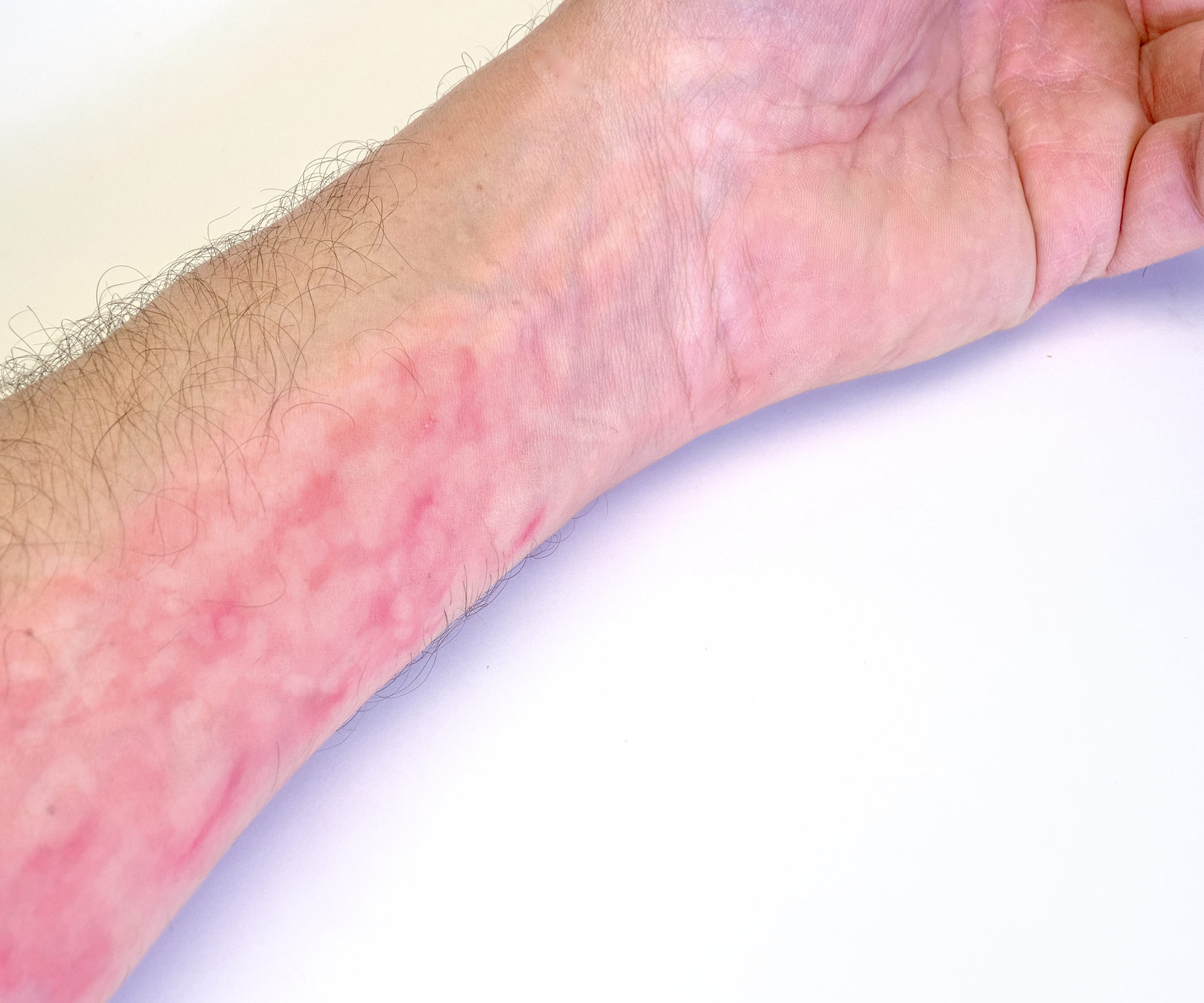At just five months old baby Archie has already been in the fight of his life.
Five days ago his parents, Josh Roberts and Katelyn Galea thought their son had an ear infection but when his lips turned grey and he showed signs of a rash they raced their baby to from Greenbank, southwest of Brisbane, to Ipswich Hospital, according to Essential Baby.
The boy was diagnosed with the potentially life-threatening meningococcal disease and was rushed to Brisbane’s Lady Cilento Children’s Hospital where he was placed on life support.

Josh Roberts and Katelyn Galea with son Archie. Facebook/Josh Roberts
Meningococcal disease is an acute bacterial infection that can cause death within hours if not recognised and treated in time.
It’s a nightmare that no parent should ever have to go through and Archie’s parents have taken to social media to share their heartache.
“Meningococcal. You hit my son yesterday like a wrecking ball but he came straight back at you like a d11 bulldozer,” Mr Roberts wrote.
“Meningococcal. You have met your match Arch is going to beat you and he is going to come out on the other side with a big smile on his face.
“This is something you only read about in the paper or see in the news. You would never expect it to hit someone so healthy and so happy, a little boy who has so much going for him so much love and a little boy who has had such a big impact on the earth already and has only been here for five months.
“Any parents that had have had sick kids and experienced what Katelyn and I are going through at this time I feel for you. This is one of the hardest times I have ever had to deal with. I have never ever loved something, someone with such passion and love.
“It doesn’t matter if you are the toughest person on this planet walking into that hospital room and seeing you like this rips me apart. You are a strong little man Arch just keep on fighting. You will get through this.”
Thankfully, the little boy’s condition seems to be improving and Archie’s mum shared this touching video of the bub opening his eyes.
“My baby is waking up!!!!!!!!! Archie, mummy and daddy couldn’t be any more prouder. You are the true definition of a fighter. I love you,” Katelyn wrote.
Apparently the meningococcal bug has left Archie’s system and his parents are just hoping he can be home to celebrate his first Christmas.
“It’s his first Christmas, so it would be great to be home for Christmas,” Mr Roberts said.
“It’s a six-week recovery. They think it will be a full recovery but he may lose a couple of fingertips.”
A GoFundMe page has been set up by a family friend to help the young couple cope with the growing medical bills.
“Since Archie has been in hospital Katelyn & Josh have been by his side and not able to work, so we have created this go fund me to help them out,” said the page.
“If you could donate even $5 to this beautiful family I’m sure it would make all difference. Please keep Archie in your thoughts x”.
QLD health experts warning residents against deadly strain of bacterial infection
It is unclear what strain of meningococcal Archie has contracted but this past week Queensland health experts warned residents against the potentially deadly W strain.
Queensland Health has confirmed a Sunshine Coast resident was diagnosed with W strain meningococcal disease this month and is recovering, reports The Courier Mail.
This year there’s been a spate of similar cases of the uncommon condition cropping up in WA, Victoria and NSW.
Australian Medical Association Queensland spokesman, Richard Kidd told the Courier Mail that we need to be prepared for this particularly unusual strain to be an ongoing problem.
“It’s here now, so we need to start anticipating that it’s going to be an increasing problem over the next few years as it has been everywhere else,” he said.
“It is a very nasty infection. At least we do have vaccines and hopefully the Government will follow England’s lead and look at building it into our immunisation program.”

Immunisation is possible.
Meningococcal: The Facts
According to Meningococcal.org.au the “majority those infected will recover fully, but 10 per cent of victims will die, and around 20 per cent will have permanent disabilities – ranging from learning difficulties, sight and hearing problems, to liver and kidney failure, loss of fingers, toes and limbs and scarring caused by skin grafts.”
In Australia there are 5 main strains of the disease, all of which now have vaccinations available from your doctor.
What is meningococcal disease?
This is an infection with the meningococcal bacteria which can cause inflammation of the lining of the brain, which is called meningitis, or an infection in the blood, septicaemia and sometimes both.
Three main bacteria can cause meningitis: meningococcal, pneumococcal and Haemophilus influenza type b (Hib). Vaccines are available for Hib, for the common strains of pneumococcal and for meningococcal B and C. Viruses can also cause meningitis.
The meningococcal bacteria are spread through droplets from the nose or throat through sneezing or coughing.
Figures show that between 2000 and 2002, 522 children under the age of four were admitted to hospital with meningococcal disease. It’s treated with antibiotics but even with urgent attention, about 10 per cent of those with the illness die. Others can be left with a permanent brain injury and deafness.
Signs and symptoms
Parents have been made well aware of the red rash associated with meningococcal disease – it’s the one which doesn’t fade when pressed with a glass. Even though it’s an important symptom of the illness, it often means the illness is already well underway.
“It’s a good sign of meningococcal disease, but you’d also like to pick it up before you get that rash,” says Dr Royle.
Other signs to look out for include fever, irritability, extreme tiredness, vomiting, turning away from the light and drowsiness.
“In young babies it’s good to have a low index of suspicion with an unwell child with a fever,” says Dr Royle.
“Parental worry about children is often very helpful and accurate. If you’ve been to the doctor and sent home, and your baby’s getting worse, or not getting better, parents should act on their own sense of worry and get the child re-checked.”
It’s also crucial to make sure vaccines are given on time, not delayed, or the consequences can be tragic.
“You don’t want to have your vaccines late, you want to get them as soon as they are due… that’s really the best thing you can do for preventing meningitis. We have seen cases in families who delayed, and that is really bad.”
Meningococcal vaccine facts
• A vaccine for Type B and C Meningococcal disease is available.
• Immunisation is the best protection against Haemophilus influenzae type b (Hib) and meningococcal group C disease. The National Immunisation Program provides the first three doses of Hib vaccine to children at two, four and six months of age in a combination vaccine. The final booster dose of Hib vaccine is given in combination with meningococcal C vaccine at 12 months of age. Common side effects from immunisations are usually mild and temporary, and do not require specific treatment.
• The duration of protection is uncertain but hopefully life-long.
• The vaccine is free from your GP.
• Side effects from these vaccines are uncommon and are usually mild
Speak to your doctor about any concerns you may have.


